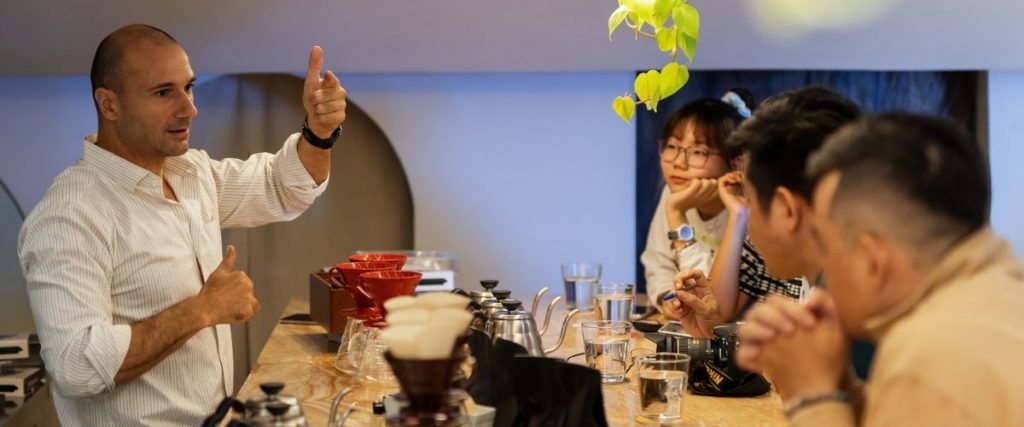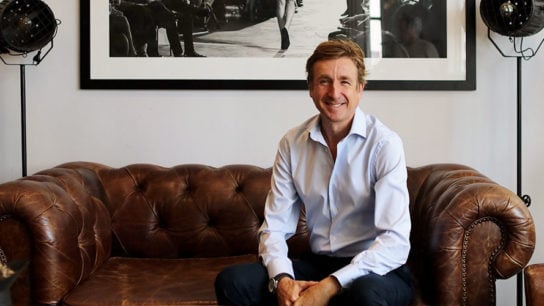From graduating in environmental science to becoming a coffee expert, trainer and reputable judge with over fifteen years of experience, Nat Paolone, the founder of Saigon’s Silvi Coffee Roasters, shares his inspirations and journey delving into Vietnam’s local coffee scene.
After more than fifteen years of living and working in Vietnam as a coffee consultant and trainer, Nat Paolone founded Silvi Coffee Roasters in 2019, a micro-roastery based in Saigon.
His coffee calling came unexpectedly during a trip to Australia, where he worked at one of Sydney’s finest premium coffee roasters- Toby’s Estate. “A symphony of aromatic and complexity of flavours,” the wonders in Toby’s cup of espresso not only changed the course of Nat’s life, but also sparked his passion to recreate and share the same unique experience through Silvi Coffee Roasters.
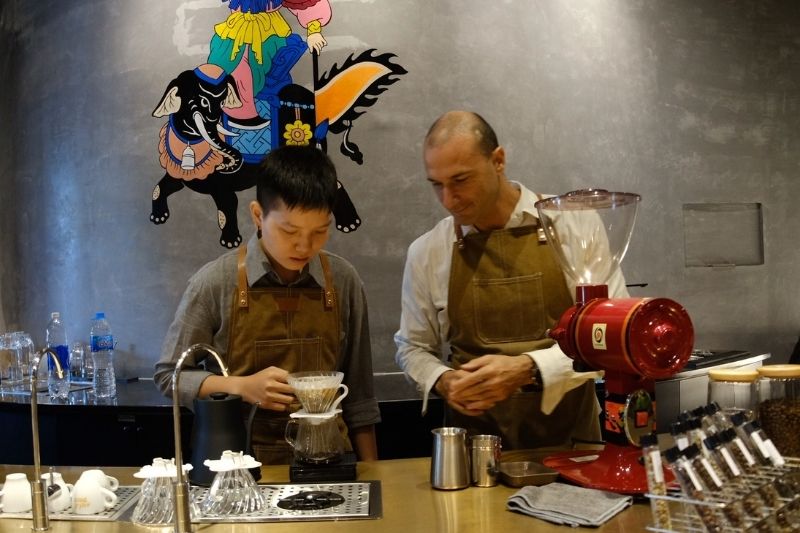
Since its founding, Silvi Coffee Roasters has grown to become a well-loved roastery in Saigon’s coffee scene. We caught up with Nat about his journey and inspirations exploring coffee in Vietnam.
At Silvi Coffee Roasters, consistency is the essence and concrete foundation engraved in every step of their coffee roasting process. This means ensuring the utmost consistency in quality roasting, brewing, and training along with providing unbiased information to customers to bring the best values in every single cup of coffee. A key factor that makes or breaks any coffee brand, Nat emphasises how the taste and quality of every single cup of coffee needs to be consistent. The moment coffee tastes “off,” customers will make a subconscious decision to leave and try other brands.
“It is a key factor but a big challenge to achieve everyday,” he explains how consistency goes hand in hand with the ability to control multiple related variables.
To Nat, being able to live in a coffee-growing country like Vietnam is one of the best charms for a coffee enthusiast, as visiting farms opens up chances to control the quality of the beans, the key player in a cup of coffee. Meeting the farmers, diving deep into learning how they pick, harvest, and process coffee beans are all extra steps that may seem tedious, but help Nat curate quality beans. Where the majority of top coffee roasters in the world would often never visit the farms they purchase beans from, Nat holds a close-knit working relationship with local farmers. This instills great pride in final products, when he can share his experience and stories about the coffee, its origins, and the hard-working farmers who grew its beans with his customers.
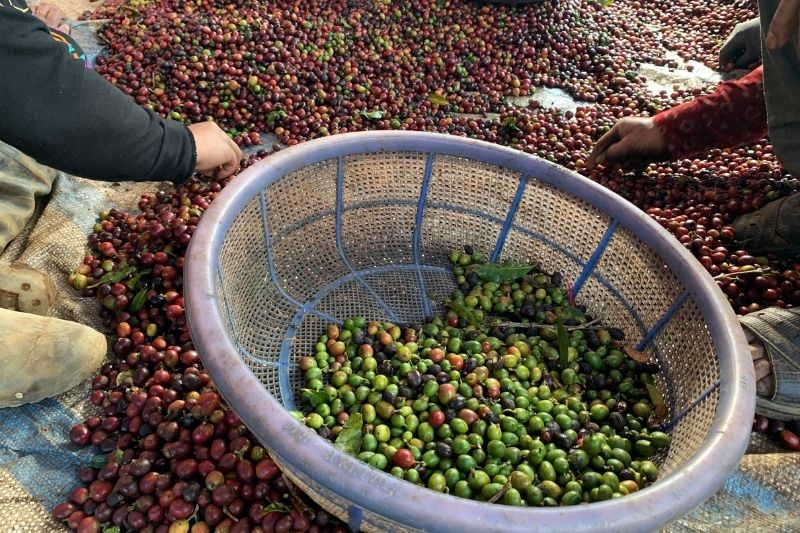
With years spent training baristas, when asked what distinguishes between a normal and top-notch barista, Nat shared how that can be revealed through a simple question that he always asks a barista: “Do you drink espresso?” As many baristas do not enjoy espresso and are only enticed by instagrammable latte art; those who make espresso, constantly tasting and breaking down coffee and experimenting with different variables and formulas are those to look for. This is not a skill that comes naturally but “that is how you know they are taking pride in their work,” Nat said.
The local coffee scene has evolved dramatically according to Nat, starting from when only traditional Vietnamese coffee was available, to now, growing exponentially, standing out in flavours and competitiveness. Major investments in unique interiors and designs are what the major crowds go for, but Nat, a firm believer in quality coffee, shares his excitement seeing a niche of coffee lovers “[distinguishing] themselves by focusing on coffee, rather than solely design.”

Unlike other markets, Vietnam is flooded with coffee brands as shop owners often choose to roast coffee beans by themselves rather than buying from seasoned roasters. The truth is coffee roasting requires years to perfect for ultimate consistency in quality, Nat predicts brands which offer greater consistency in quality roasting and controlling variables will achieve sustainable growth while the opening of new coffee shops, especially those that roast independently, will eventually slow down and drop.
Like many other businesses in todays’ era, marketing is key and crucial to success, but “entirely disconnected to the quality of coffee,” Nat shares. Similar to how expensive espresso machines can be spotted everywhere, often only beneficial as a marketing strategy with no correlation to a better cup of coffee, as time passes, when more people are able to know how good coffee tastes, Nat expects to see a future where “high quality marketing and packaging go with high quality coffee.” It all boils down to the coffee itself.
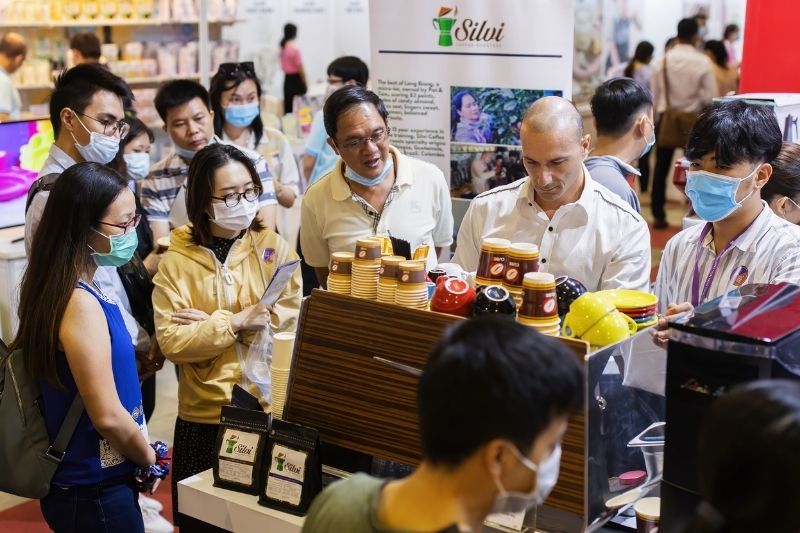
With coffee culture being an inseparable part of Nat’s identity, his definition of a great cup of coffee is “simple and inexpensive but bursting with unique flavours and complexity, very balanced and pleasing [on the palette].”
Yet, coffee is highly subjective and relies heavily on the coffee you drink daily. Just as you would gift a $5,000 bottle of award-winning wine to somebody who is not a wine-connoisseur, they would not be able to fully value its essence. Nat adds that learning to drink and appreciate a high quality cup of coffee is a step by step process, starting by gradually building up people’s palette with better coffee through their personal perception of what is a good coffee.
Nat hopes to further grow Silvi Coffee Roasters’ brand, building the team with a special focus on coffee training and knowledge sharing through workshops. Making Vietnam his home, Nat wishes to continue learning and honing his craft, continuing to “grow together” with the local coffee community.
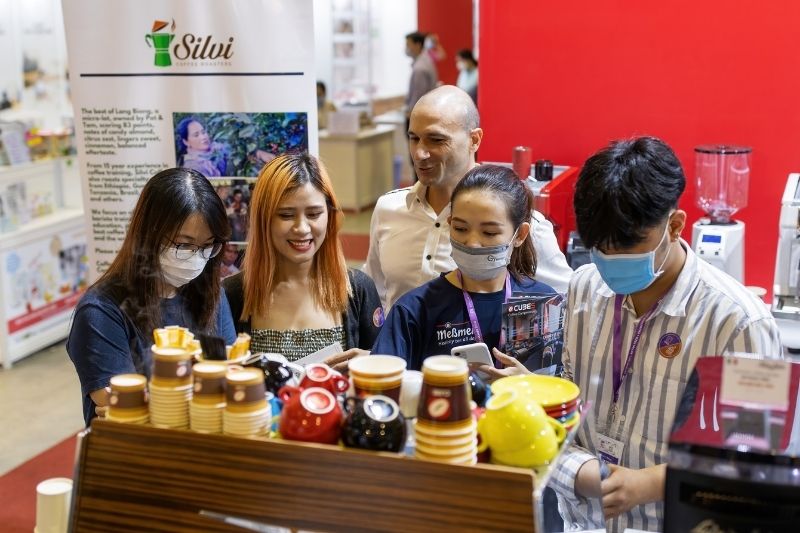
Address: 16/2 Road 46, Thao Dien Ward, Thu Duc City, Ho Chi Minh City
Opening hours: Mon-Sun 7am-5pm (except Wed & Sat 9am-6pm)
Related Articles
5 Must-Visit Specialty Coffee Shops in Saigon
AirX: The Entrepreneur Who Engineered The World’s First Biodegradable Coffee Face Mask
